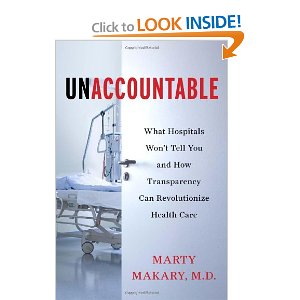Risks of Common Hospital Errors, Medical Mistakes Highlighted in New Book
It is unfortunate that patients often are unable to obtain usable information about the real records of the doctors who operate on them or the hospitals where they are treated. A new book by a prominent Johns Hopkins surgeon highlights the risk of common medical mistakes, arguing that the healthcare system could be revolutionized with increased transparency and accountability.
 Dr. Marty Makary, a cancer surgeon at Johns Hopkins Hospital in Baltimore, recently published a new book, “Unaccountable: What Hospitals Won’t Tell You and How Transparency Can Revolutionize Health Care” (Link to Amazon)
Dr. Marty Makary, a cancer surgeon at Johns Hopkins Hospital in Baltimore, recently published a new book, “Unaccountable: What Hospitals Won’t Tell You and How Transparency Can Revolutionize Health Care” (Link to Amazon)
The book details Makary’s own experiences with bad medicine and patient misinformation, as well as provides a look at what the public doesn’t know about hospital care and what it thinks it knows.
About 100,000 patients are killed each year and 9 million injured due to medical mistakes, Makary notes. Because of the current lack of transparency over hospital and doctor performance, patients rarely really know whether the hospital they are in, or the doctor seeing them, is one of those where the mistakes are most common.
This is because both doctors and hospitals suppress negative data about their performance, and fight tooth and nail to prevent that information from becoming public, Makary’s book highlights.
No state requires doctors or hospitals to report their rate of surgical complications, avoidable fatalities, or hospital mistakes. While data on hospital-acquired infection rates is required by about half the states, it only provides a tiny peek into a hospital’s performance.
When hospitals are required by organizations to give more detailed performance data, it usually comes with the requirement that the information be kept secret. Doctors and health care workers who know about problems with other doctors and surgeons, who may pose a danger to patients, are often forced to keep quiet as well, or face losing their jobs, according to Markay.
Attempts to get hospitals to volunteer the information have mostly failed.
A report late last year by the U.S. Department of Health and Human Services office of inspector general (DHHS-OIG) determined that only about 14 percent of all medical mistakes that harm patients are reported each year nationwide.
Medicare reimbursement comes with a requirement that hospitals track medical errors and adverse patient events, and also calls for them to create incident reports for errors that result in patient harm. However, a review of 189 hospitals’ records from across the country revealed that only about one out of every seven patient harm incidents was properly reported.
Not surprisingly, most of the errors that were actually reported came from reports filed by nurses, not doctors.


1 Comment • Add Your Comments
Susan says:
Great article. I think we are moving towards more reporting of incidents but let’s put our heads together to figure out how to prevent them. It’s all part of a process.
Thank you Carl.
Posted on March 20, 2013 at 11:25 am